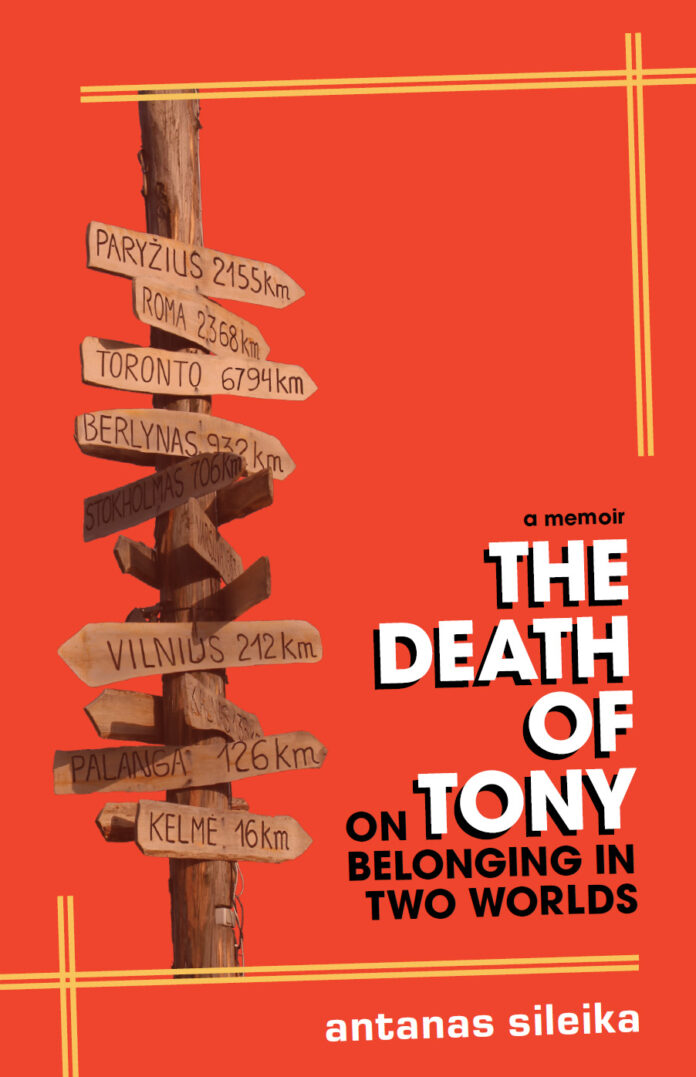
The Death of Tony: On Belonging in Two Worlds
by Antanas Šileika
230 pages, Stonehewer Books Victoria, BC, 2024

“There is no end to my scribbling,” he writes, “I need to rush to write up my latest dreams”.
Canadian author Antanas Šileika is certainly wasting no time. Right on the heels of the Lithuanian premiere (in November, 2023) of the film based on his book Provisionally Yours (translated there as Laikinai Jūsų), Šileika’s newest, The Death of Tony, will soon to be available.
Canadian? Yes, born in Canada – but his work is also translated and published in Lithuania. Does that mean he is a Canadian-Lithuanian author? Lithuanian-Canadian? “I write about there for here, and now here has been translated for there and it is bewildering and wonderful”.
Such conundrums of identity and loyalty are exactly what his new book is about. It is primarily an autobiography, although some glimpses into his life were offered in the collections of memoirs contained in The Barefoot Bingo Caller and Buying on Time. Yet this new book is not just about him.
Šileika is a master story teller. We read this story to discover his journey as a boy born in Canada to a Lithuanian family, a student, an author, a journalist and a teacher, all the while absorbing his observations and insights about people and issues around him. Every chapter (each separately named) is a story with a point, yet they interlace, weaving together the life of a child of immigrants, the making of a writer, and the context that informed him.
We meet his parents, his brothers, his friends, and later his wife and family. We encounter other people who influenced him, as well as those who changed him. We despise his friend’s mother, who said of him – “What a beautiful boy – such a shame he’s a foreigner”. He reveals his ardent desire to be English, and how he came to the realization that “I could not be English, but had the gift of the English language.”
We see him grow, develop his passion for English literature, and begin to understand that he is different from his friends and even his brothers, at the same time knowing he belongs to a type of secret “club” by being part of the Lithuanian community. His ambivalence toward the community comes and goes, but finally he accepts the duality of his life, and commits himself: when accused of “assimilating” by using the name Tony instead of Antanas, when the Lithuanian independence movement soars and he travels there to write about it, and when the decision to pass on the language to his children becomes a mission.
Šileika shares his thoughts on various authors (with a helpful list at the end of the book), and, most relevantly for those readers who are his cohorts – the “boomer” children of immigrants – fills possible gaps in our knowledge of wartime Lithuanian history and the issues that came after, including guilt for the country’s role in the Holocaust. Above all, he is the voice of a generation when he speaks of the “back and forthness of immigrants and their children”, of feeling invisible, of being “Eastern European”, of the inner conflict between nostalgia and reality, and the constant search for homeland that echoes in our hearts.
In The Death of Tony, his voice is casual, balanced, and informative, with the wry humour that makes him special. Readers of any generation will feel they’ve had a satisfying and illuminating conversation with a friend.
The Toronto Star’s Philip Marchand said of Buying on Time that Šileika made a significant contribution to the body of immigrant literature. The Death of Tony is a substantial step further.





























